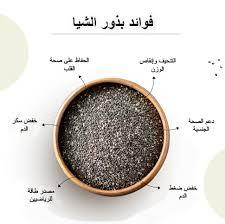Chia Seeds Benefits: Health Advantages, Usage, and Potential Risks
Chia seeds are tiny superfoods packed with nutrients that support heart health, regulate cholesterol and blood sugar, improve skin and bone health, and aid in weight management. Learn their benefits, how to consume them, and precautions.

Chia seeds are small yet nutrient-dense seeds offering numerous health benefits. Rich in omega-3 fatty acids, fiber, protein, calcium, magnesium, and antioxidants, they contribute to overall well-being and disease prevention.
Health Benefits of Chia Seeds
Heart Health:
Chia seeds contain antioxidants like quercetin and omega-3 fatty acids, which reduce heart attack risks and support vascular health.
Cholesterol Regulation:
They help raise HDL (good cholesterol) and lower LDL (bad cholesterol), reducing cardiovascular risks.
Weight Management:
High soluble fiber content forms a gel in the stomach, promoting fullness and reducing appetite, while protein further helps control food intake.
Skin Health:
Antioxidants combat free radicals, supporting cell repair and enhancing skin radiance while preventing signs of oxidative stress.
Blood Sugar Control:
Chia seeds stabilize blood sugar levels and help manage insulin resistance and diabetes due to fiber and alpha-linolenic acid content.
Bone Health:
Rich in calcium, magnesium, and phosphorus, chia seeds strengthen bones and help prevent osteoporosis.
Nutrient-Rich:
They provide omega-3 fatty acids, proteins, carbs, dietary fiber, antioxidants, and essential minerals.
Additional Benefits:
Blood pressure regulation.
Anti-inflammatory effects.
Increased energy and vitality.
Oral health support.
Anti-cancer properties in some studies.
How to Consume Chia Seeds
Eat raw.
Soak in water or juice.
Add to oatmeal, yogurt, salads, or baked goods like bread and cakes.
Potential Risks
Digestive Issues: May cause constipation, diarrhea, or bloating if consumed in excess.
Choking Hazard: Seeds can swell and block the throat if eaten dry.
Drug Interactions: May interact with blood pressure or diabetes medications.
Allergic Reactions: Similar to sesame or nuts; can rarely cause anaphylaxis.
Consumption Tips
Soak seeds for 5–10 minutes before eating.
Start with small amounts and gradually increase while drinking water.
Recommended daily intake: 1–3 tablespoons.
Stop immediately if any adverse symptoms appear and seek medical help
تؤكد دراسات حديثة أن اتباع عادات بسيطة مثل النشاط البدني المنتظم وشرب القهوة يمكن أن يسهم في تقليل خطر أمراض الكبد وتحسين وظائفه بشكل ملحوظ.
أظهرت دراسات حديثة أن الجلوس لساعات طويلة وقلة الحركة اليومية قد تسبب تلف المفاصل والعضلات، مما يزيد من خطر الإصابة بالتهاب المفاصل حتى في سن الشباب.
دراسة حديثة تكشف أن تناول جرعات عالية من مكملات فيتامين سي يمكن أن يسبب أضرارًا خطيرة للكلى ويزيد خطر تكوّن الحصوات، خاصة لدى الرجال ومن لديهم تاريخ مرضي سابق.
دراستان جديدتان تكشفان عن علاقة قوية بين أمراض اللثة وتسوس الأسنان وزيادة خطر السكتة الدماغية، مما يبرز أهمية العناية بصحة الفم لحماية الدماغ والقلب.




